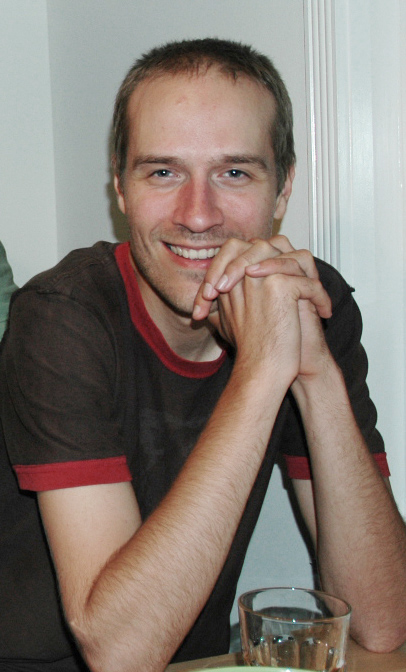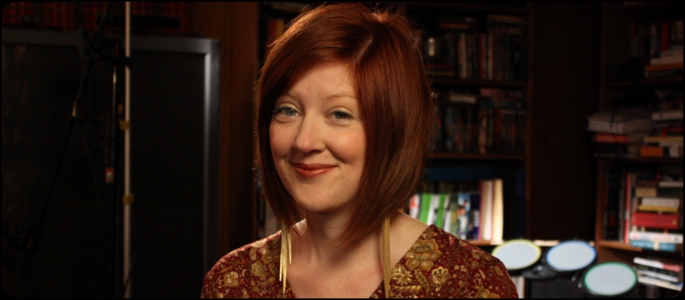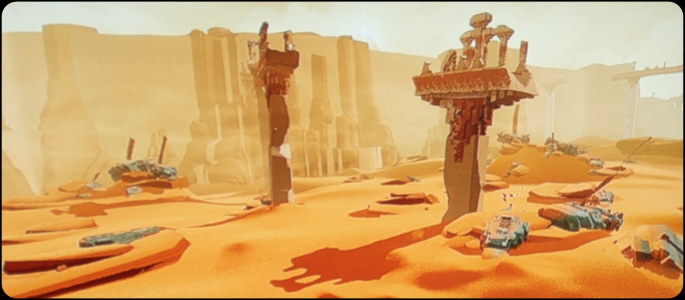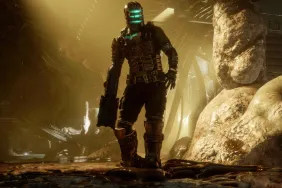Be sure to first read part one of our in-depth interview here.
We talk to director Stephanie Beth about Us and the Game Industry, a film following indie developers like Jason Rohrer and thatgamecomany, about what motivates developers, the importance of a studio label and sexism in games, in part two of an exclusive interview.
We’re obviously in quite a rapidly evolving part of history in the games industry, do you think that will change continue to get faster, and do you think that the ratio of indie to mainstream will stay the same?
I think the ratio of mainstream to indie is going to stay the same, and yet, the overall productivity will keep increasing so that, as things become more common – and I think it’s the dream of the smaller games developer – we will simply have more maturity of variety so that there is choice for types of games. That’s not the revolution, simply a better consumer supply.
With the developers you followed, did you find that thoughts of success and profitability affected game design, or it was just about the art?
It was always about the art, which satisfied me as well, it made me feel fine. I would say it was always about the art specifically to the one-off game developers, and that was not always the case if a business was involved in, say, microfinance transactions. I think every developer had to rationalize to themselves “this is the market I’d like to best behave in”. So you get a Jason Rohrer in this world and you know that he’s living off the grid in terms of consumption and wasteful consumption, and you know how much he needs to live on, and you know that he will make a game in 3 or 6 months, and that could be his living for the next two years. I remember having an early conversation with Kyle Gabler from World of Goo, and we all know some of the early games made instant turnover. And of course I spent a lot of time with Edmund and Tommy and they made a great turnover. But on the whole, no one has a clue, so they don’t even think about it, they push it out of their mind, and that’s what’s lovely, it is like hanging around with artists of that type – that’s if they see themselves as doing one-offs. But definitely, if you’ve had fifteen years in the corporate world, if you’ve come out as a graduate from a business management course with a double degree in mathematics from MIT and you’ve migrated West to even live, cause you want to be on the West coast of America, you don’t think like that, you think based on new business principles.
Well, the end of all that phrasing leads to the observation that concept and design is about concept and design, art is art, programming is for execution. These are serious steps – making execution. Contemporary marketing nous has led to the new styles of business transactions we know of today. Game marketing styles can be lightweight and profitable. But dreaming and vision must come first. The mavericks of the latter have never cared what level of education they had. Those who have more education toy in different strata as their interests have tended to widen. Tastes and style get marketed differently. You know, it’s a big interesting topic, especially in a present day economy and since the literacy for game worlds differ from analogue experiences.
 So did you follow any developers who didn’t make it then, or did you focus on the winners?
So did you follow any developers who didn’t make it then, or did you focus on the winners?
I put myself in the middle of complete success stories.
Obviously Jason [Rohrer] is one of those, do we get so see anything about his next game?
Yeah we do, that’s the great thing. Jason has reserved his next game for the film. I’ve been talking to him since 2009 and the internet has served him fairly well and various events he has been to, and his public, his own personal public you might say, his eclectic critics, they’ve served him well. So he’s told me he’s working on something new and he’s really happy to give me all the data because the edit will give him enough time to get it finished [laughs]. So that’s good.
Can you give us any hints about it?
No, no, he won’t tell me a thing. I’m actually talking to him in about eight days [laughs]. Oh actually, my only hint will be that I went to visit him in New Mexico, so I know that an incident there has triggered the game. I saw the streets where he lives, where that occurred.
Very cryptic, that is.
Yes [laughs], so I’ll see what I can do on my website about that.
But you obviously live in New Zealand, was that a problem, always having to fly over to the States?
I could Skype straightaway with them as soon as I decided I’d written an email and they said “yes alright you can talk to us”. And I could go to San Francisco where there was a convergence of people which was very economic. I actually married a Canadian so I could build in some personal trips on the return flight [laughs]. And, by the time we got hit by the earthquake – I live in Central City Christchurch, thank heavens – we were on fiber optic cables, so even though buildings were all down, I was on the internet and still went in April 2011 to Los Angeles to carry on with my shoot as normal. I’m in a broadband fiber optic safe world, no matter what happens, no matter what tempest hits. I think one of the early rebuild businesses that’s going into the CBD is a collaboration of about seven high tech businesses. It received a government business initiative grant of some kind, like a five year tax write off.
And that could be your next documentary.
Hah, who knows? There’s a lovely film actually, that’s been shown in London, called “When a City Falls” by Gerard Smyth. He lives on the edge of the CBD. He’s made a 107 minute documentary about experiencing the quake. The thing that’s of course reassuring among westerners – loss of life not withstanding – it’s fascinating to watch how people cope when they’re stripped of everything, when they don’t have insurance but they still have the wherewithal to have a will to cobble things together. It’s so wonderful to watch civic duty at work. So, concerning a future film, I have allowed the idea to flutter by me. I’ve probably got 10 years tomake a film about a city make-over if I choose.

So you have given thoughts to your next project then?
Well I have given thoughts to that, it’s not an understatement to say that living here is pretty intriguing. I love still doing this game development topic, and there’s of course every reason to think that there’s something to do in five years that compounds on shifts. Because there’s so much talent at every place you turn, even though, at the moment, we’re only really documenting the Western world really.
Yeah, there’s emerging games industries in India, China – everywhere really.
Exactly. And of course the thing that’s a curious question is: When do more crossovers begin and end? You know how you were asking me how did I get the growth curve? I kind of attempted in my production log entries to point out to myself why I felt confident that I had comprehended what was going on. I actually used skill with sport as my point of entry with doing the documentary. I used to think about how I didn’t sit around necessarily doing Scrabble or playing Chinese Checkers when everyone else was, I’d rather read a novel. And I used to think what I didn’t do. But this researcher that I keep mentioning, he’s my son so I could have complete tabs on seeing why he was dropping out of University and going into the industry [laughs].
So he’s going to be a game developer?
He’s become a concept artist for iPad games.
I’m jealous, I can’t draw.
Isn’t it funny? They’re rare, the people who do the concept art are rare. He works in a company where there’s three of them who draw, and the whole company has got a staff of seventy.
Yeah, that’s a pretty small percentage.
Yeah, it’s interesting isn’t it? But it’s the programmers on the whole in this documentary that I particularly wanted to try and become more acquainted to and get them to show what they’re doing.
Do you think that’s a problem? With big movies, people generally know the director or the screenwriter, but there’s still very few gaming celebrities, and even then, it’s such a collaborative process that it’s hard to credit one individual.
Oh absolutely, of course the perception of thatgamecompany – which is a marvelous perception to hold onto – is team work, you have to have a team and be perceived as a team and so the label of the team is embodied by them all. Who knows what my special features will be, there will be some of these more obscure debates I think, like at the dinner table, like ‘is it important to have a label or is it not?’ In the case of Jason Rohrer, he’s really highly principled about the early days of game development where the game developer was known by name, and he’s very dubious about the treadmill of corporatization where the label counts for everything. I think where I have very happily, but very carefully, stepped into corporate waters, you might say, is by going into thatgamecompany. It has been wonderful being fully aware that they’re a small body, but over in California, you probably can imagine that it has got a confident and a highly developed music industry, so there’s a lot of symbiotic behavior that happens over there that’s very progressive. Remember I mentioned Sony supporting thatgamecompany by extending their development cycle – that’s a salary for thirteen people for five months. Sony must have perceived this as an artistic risk well work the value for money. That is positive local corporate behavior.
Have you talked to thatgamecompany about how they no longer have a Sony contract and might go multiplatform?
A little. Nothing we can really take anywhere here.
Also, talking about titles, I was interested in the title for the film.
[Laughs] I know, the great grammatical error. It’s kind of semiotically playful, that’s the honest answer. There are two steps I took: When I went to San Francisco anf I said that when I do interviews I shall be expecting them to give open-ended answers for the filming, so I gave them a bullet-list of eleven words and asked them to highlight the words they liked. I listed words like ‘us’, meaning we, we small developers who are independent and wandering into IGF. Other words were ‘communications’ and ‘prototyping’. I bought the domain about two years ago. I had to be transparent and honest about how this is about a democratic movement of people and we work small because we have more power that way, we have more autonomy that way.

You directed the feminist film I Want to be Joan, does it worry you that the games industry is often said to have gender inequality?
Well life’s too short to worry. From my personal point of view, the investment I made in some films I’ve made so far, it’s quite interesting to go single sex anyway, no matter what the so-called balancing act is in life. I believe that certain ways of thinking are better served by catering to subsets of people, you might say, and even that aside, what it means is that the frontier of people who were getting success with their publications are predominantly male. I look at Kickstarter, and 90% of the people who are pledging are male, so I’m simply in a demographic. My researcher was male, I’m simply reporting a demographic in an area where there’s a desire and a need. Now, sometimes, back in the 70s I’d write to a woman film camera operator or, in the case of 2008, I wrote to two women developers who did not reply. I think it’s just that those are the phases of imbalance that come on through the way that we behave with each other until it finds its own level over time.
Mainstream games also often over-sexualize female characters with big, busty characters with very little clothing. Do you think that’s a problem?
Oh I definitely do, Sebastian. When our task is to make a film about people who work at an excellent level, some of the political side of it all doesn’t come into the argument for the aesthetic. If you stay in the world where people have had more privilege and, in this case, the male with game development, it’s from time within research and development that strides of increased sensibility are made. That’s as powerful to show as people who sometimes are still only learning. Also, to target a minority group, it can be hard on that person who becomes seen as a representative. In terms of making a representation shift it has been delightful to talk to the producer of Journey, Robin Hunicke, because her experiences over the fifteen years as a game professional are tremendous to hear spoken.
So that’s something we’ll see in the film?
Yeah, she’s got quite a lot to say about where games can be positioned, you probably got a little breath of that in the trailer.
Think this film sounds interesting? Be sure to help it become a reality by contributing to its Kickstarter fund.
there’s enough complexity there.








